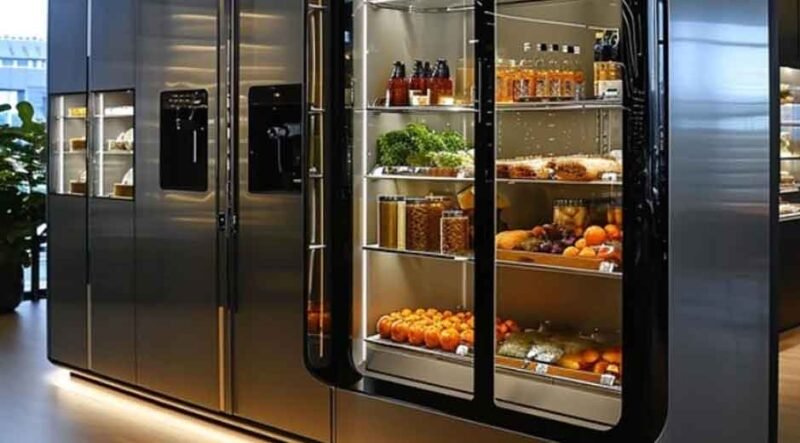In today’s fast-paced foodservice industry, efficiency, reliability, and innovation are no longer optional—they are essential. Among the various tools that restaurants, cafés, and catering businesses rely upon, the commercial fridge stands out as one of the most critical investments. The evolution from traditional refrigeration units to smart commercial fridges with temperature control has marked a significant shift in how businesses manage food storage, reduce waste, and maintain safety standards. For entrepreneurs and professionals familiar with the restaurant industry, understanding the benefits of these technologically advanced refrigeration solutions is crucial.
A commercial fridge is no longer just a cold storage box; it has become a sophisticated piece of equipment capable of offering precise control over temperature settings, real-time monitoring, and even predictive maintenance. Smart commercial fridges with temperature control have revolutionized how businesses manage perishable goods. Unlike conventional fridges that require manual checks and adjustments, these smart units can automatically regulate their internal temperature to ensure that food remains fresh for longer periods. This is particularly important for businesses that deal with a high volume of perishable items, such as fresh produce, dairy, or meat. By maintaining an optimal temperature, smart fridges reduce the risk of spoilage, minimize food waste, and enhance food safety compliance.
One of the key advantages of smart commercial fridges is their ability to integrate with other restaurant management systems. Many modern units come equipped with digital interfaces that allow managers to monitor temperature, humidity, and door activity remotely. This connectivity not only provides peace of mind but also ensures that any irregularities are addressed promptly. For example, if a fridge door is left open or if the temperature rises above a certain threshold, alerts can be sent directly to the manager’s phone or computer. Such features are invaluable for multi-location operations or businesses that operate 24/7, as they reduce the likelihood of unnoticed temperature fluctuations that could compromise food quality.
Display fridges, in particular, have benefited greatly from smart technology. Traditionally used in cafés, convenience stores, and supermarkets, display fridges serve the dual purpose of preserving food and showcasing it to customers. Smart display fridges now come with LED lighting, adjustable shelves, and temperature zones that can be customized based on the type of product being stored. For instance, beverages might require slightly cooler temperatures than fresh pastries or dairy products. By offering precise control over these settings, smart display fridges help businesses maximize both product visibility and freshness, enhancing the overall customer experience.
Energy efficiency is another critical factor that makes smart commercial fridges appealing to restaurant operators. Traditional refrigeration units often consume large amounts of electricity, leading to significant operational costs. Smart fridges, however, are designed with energy-efficient compressors, LED lighting, and intelligent temperature management systems that optimize power usage. Some models even feature adaptive defrost cycles that only activate when necessary, further reducing energy consumption. Over time, these efficiency improvements translate to substantial cost savings, making smart fridges not just a practical choice but also a financially sound investment for businesses of all sizes.
Moreover, modern commercial fridges are designed with sustainability in mind. Many units now use eco-friendly refrigerants with low global warming potential, aligning with the growing demand for environmentally responsible practices in the foodservice industry. Restaurants and cafés that adopt smart commercial fridges with temperature control can proudly highlight their commitment to sustainability, an increasingly important factor for attracting environmentally conscious customers. Additionally, the combination of energy efficiency and precise temperature management helps reduce food waste, further supporting eco-friendly operational goals.
For businesses that manage multiple types of food products, flexibility is a significant advantage offered by smart commercial fridges. Multi-zone refrigeration allows different sections of the fridge to maintain separate temperature settings. This is particularly useful for establishments that store raw meats, seafood, dairy, and fresh produce in the same unit. With separate zones, cross-contamination is minimized, and each type of product can be stored under ideal conditions. Such features are especially valuable for professional kitchens that must comply with strict health and safety regulations while maintaining the quality and flavor of their ingredients.
Integration with inventory management systems is another feature that sets smart commercial fridges apart. Advanced models can track stock levels and even alert managers when products are nearing their expiration date. This capability simplifies inventory planning, reduces unnecessary purchases, and ensures that popular items are always available. In addition, the historical data collected by smart fridges can provide valuable insights into consumption patterns, allowing restaurants to optimize their menu planning and reduce operational inefficiencies. For entrepreneurs planning to scale their business, these insights are invaluable for informed decision-making and strategic growth.
The benefits of smart commercial fridges extend beyond traditional foodservice settings. Convenience stores, supermarkets, and specialty food shops also benefit from the precision and reliability these units offer. Display fridges equipped with temperature-controlled compartments ensure that beverages, snacks, and prepared meals are kept in optimal conditions while remaining visually appealing to customers. Furthermore, smart fridges with self-monitoring capabilities reduce the need for constant manual checks, freeing up staff to focus on customer service and other essential tasks.
As technology continues to advance, smart commercial fridges are incorporating additional features designed to enhance usability and convenience. Touchscreen controls, customizable temperature presets, and remote diagnostics are becoming standard in high-end models. Some units even offer data analytics dashboards that help managers track energy usage, temperature fluctuations, and inventory trends in real-time. For businesses aiming to streamline operations and reduce labor costs, these capabilities offer tangible advantages.
Long-term reliability is also a major consideration when investing in a commercial fridge. High-quality smart units are built with durable materials, robust compressors, and advanced insulation to ensure consistent performance even in demanding kitchen environments. By reducing the risk of mechanical failure, businesses can avoid costly downtime and maintain uninterrupted service, which is critical for customer satisfaction and operational efficiency.
For restaurant owners and catering businesses looking to expand their operations, selecting the right smart commercial fridge is a strategic decision. Factors to consider include capacity, type of refrigerant, energy efficiency ratings, temperature range, and compatibility with other kitchen equipment. Consulting with a professional supplier or technician can provide valuable guidance in choosing a unit that meets both operational needs and budgetary constraints. Additionally, exploring long-tail keywords such as “best smart commercial fridge for restaurants,” “high-capacity display fridge,” or “energy-efficient commercial refrigeration solutions” can help in researching options and making an informed purchase decision.
In conclusion, the evolution of commercial fridges into smart, technologically advanced units has fundamentally transformed food storage and management in the modern foodservice industry. Smart commercial fridges with temperature control offer unparalleled benefits, including precise temperature regulation, energy efficiency, remote monitoring, and inventory management. Display fridges have become more than just storage units; they are marketing tools that enhance product visibility and customer experience. For entrepreneurs and professionals familiar with the restaurant industry, investing in a smart commercial fridge is not just about keeping food cold—it is about optimizing operations, ensuring food safety, reducing waste, and ultimately driving business success. As technology continues to advance, the adoption of smart refrigeration solutions will become increasingly essential for any business looking to thrive in a competitive market.
By understanding and leveraging the capabilities of modern commercial fridges, businesses can achieve greater efficiency, maintain the highest food quality standards, and offer a superior customer experience. Whether it’s a small café, a high-volume restaurant, or a retail food outlet, smart commercial fridges with temperature control are indispensable tools that help businesses stay ahead of the curve. For anyone planning to enter the foodservice industry or upgrade existing operations, embracing smart refrigeration technology is a practical and forward-thinking choice. As the industry evolves, those who invest in intelligent, reliable, and efficient commercial fridges will be better positioned to meet customer expectations, reduce operational costs, and succeed in an increasingly competitive market.









